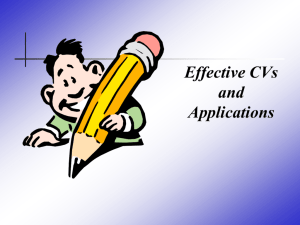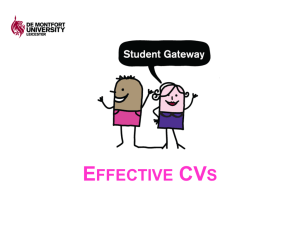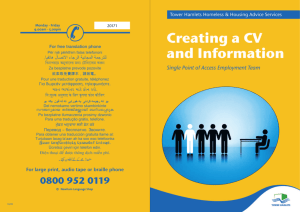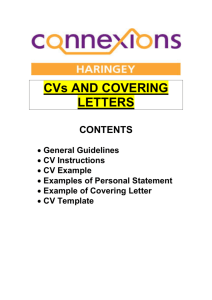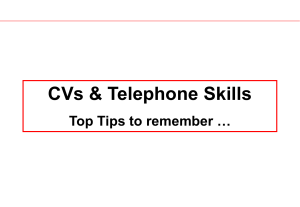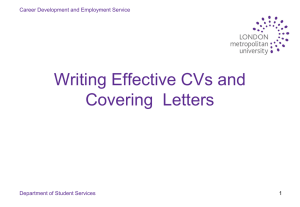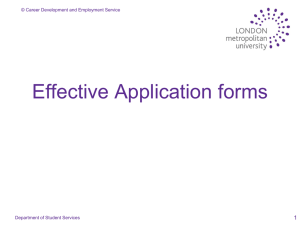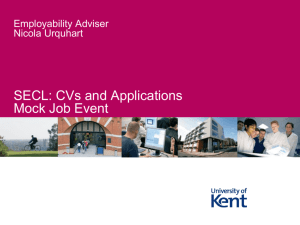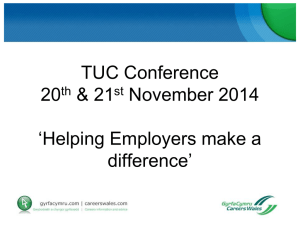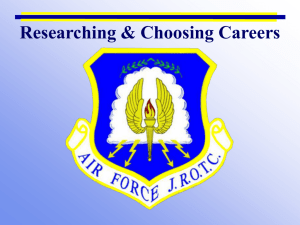How to Write a Winning CV
advertisement
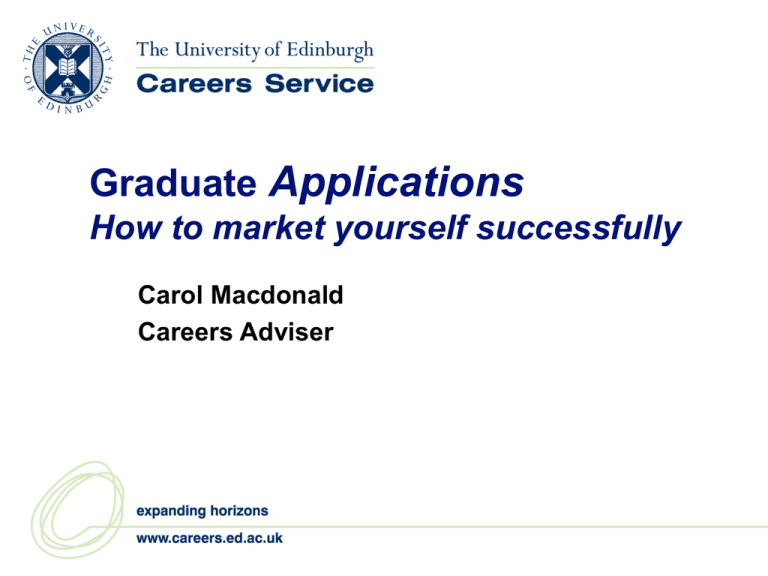
Graduate Applications How to market yourself successfully Carol Macdonald Careers Adviser What employers look for Good match to requirements Relevant skills/competencies, attributes and experience Evidence of achievement/success What you can bring to their organisation What employers look for Grad Software Engineer Requirements Strong academic record - BSc /MSc / PhD a plus Experience: UNIX/Linux or Windows and/or Mac environments, distributed systems, machine learning, information retrieval and TCP/IP programming in C, C++, Java and/or Python network programming and/or developing/designing software systems Software Engineer What else is wanted? Problem solving ability Team players Analytical thinkers Trouble shooting ability Technology whizzes Creativity Flexibility Aptitude to ‘zoom in’ on detail Agility to ‘zoom out’ & see bigger picture Personal drive Competency Frameworks IBM Foundational competences Adaptability Client focus Communication Creative problem solving Drive to achieve Passion for business Taking ownership Teamwork and collaboration Before you start any application! Research the job! What’s involved? What’s required? qualifications personal attributes experience skills/competencies Analyse how you measure up! Relevant aspects of degree? Relevant skills/interests/personal qualities? Appropriate experience? - paid/unpaid work? - societies/clubs/life roles? Evidence to demonstrate motivation? essential/ desirable/ preferred? Scope to develop? Explore organisation & sector Written Applications What do you need to stand out? Easy to read - good presentation - clear layout - well written (inc.spelling/grammar) Clear motivation Relevance Evidence that you have the skills/experience required for the job/course Sufficient detail “the best predictor of future success is past performance” What should a CV contain? Personal details Education Other qualifications - technical skills /personal skills Work experience Interests/positions of responsibility Referees Choose a layout to fit your information NOT information to fit a set layout Different types of CV chronological (conventional) skills based thematic (e.g.relevant experience, research experience) technical (incl. academic) creative international (see www.prospects.ac.uk, www.eurograduate.com or ‘working abroad’ section of careers centre) Skills Profiles Communication/ Interpersonal Skills - Dealt confidently with staff, colleagues & customers in retail management. - Built effective working relationships with colleagues of all levels and backgrounds. - Report writing experience gained in business and academic environments, including …. - Presentations made throughout degree course to staff, students and visiting industrialists. Team Working/ Leadership - Group work projects undertaken during 2nd and 3rd year at university - Collaborated closely with others routinely in both my admin job and committee roles. - Team building and staff development was an essential aspect of my supervisory role with ABC Foodstores, and one which I greatly enjoyed. Planning & Organising - Effective time management, self discipline, and the ability to work under pressure has enabled good academic achievements while juggling part-time work, committee roles & study - Thorough forward planning, good data management and ensuring access to labs and equipment, has been critical to the success of my third year project. - Checking and tracking data in my part-time administrative role requires accuracy and close attention to detail. Covering Letters – what to include? What you are applying for and where advertised Why you are applying for this job/course at this particular firm/institution? Emphasize your suitability/strengths (inc relevant courses, skills, experience) Other relevant information omitted from CV Confident conclusion Email letters – are they different? Begin simply with ‘Dear……..’ Keep the tone formal - don’t use slang/text speak Keep your sentences short Try not to exceed one screen length Make sure you attach your CV (& covering letter?) Use a ‘signature’ at the foot Application forms – Some tips! Allow sufficient time Answer all the questions Try & make the form work for you Crucial part is usually ‘essay’ questions Need to adhere to space/word restrictions Draft answers in ‘word’ first May need to use ‘key’ words (screening) Example of key words “As well as planning the routes for our expedition, I had responsibility for arranging publicity and securing business sponsorship to the tune of £5K. I achieved this by contacting local companies, employer associations and the regional press; by phone and email to negotiate sponsorship and publicity.” What skills was this job requiring? planning negotiating Communications - written & verbal Example Competency Questions Frame answers using ‘STAR’ Situation, Task, Action, Result Describe a situation where you have used your influencing skills to achieve a goal. Include issues you were faced with and how you overcame them. Describe a challenging project, activity or event which you have planned and taken through to a conclusion. Include your objective, what you did, any changes you made to your plan and state how you measured your success. Describe a difficult problem you have solved. What was the problem, what alternatives did you consider and how did you determine the solution? Answering those difficult questions! Prepare – Plan your best example for every question - using different situations for each! Answer questions fully – may be several parts Focus on what YOU did/learnt/achieved NOT the team/other people (‘I’ not ‘we’) Be specific, quantify answers & don’t waffle Present answers clearly Make it RELEVANT to job/ firm/ course Don’t repeat yourself Strong/good answers……. Use short sentences Use active words/verbs Be concise and succinct Answer ALL parts of the question Concentrate on ‘how’ not just ‘what’ QUIZ Good and not so good answers! What do you think? Example 1 – Managing Relationships “I am open, friendly, and polite and keen to see that everyone in the team is working well. I am always sensitive when dealing with someone in the team who is upset or under pressure and always try to help them.” “ I noticed that one of my team seemed to be under pressure, although he hadn’t said anything specifically, and his work was suffering. I arranged a chat with him and tentatively asked him how things were. It transpired that he had personal problems at home and that made it difficult for him to focus on work issues. Over the next few weeks I made time to listen regularly to how things were developing and to discuss options with him. Although the problems were not resolved for some time, the fact that I knew what was happening helped him cope with the pressure he was under and deal with his work competently.” Example 2 - Problem solving “Staff shortages at my language school in Spain meant I had to teach larger classes than usual. Students had widely different levels of proficiency. They also had high expectations of the school having already paid their tuition fees. I divided each class into 3 groups according to their language skills and prepared appropriate lessons and teaching materials. A lesson lasted 60 minutes so I rotated 20 minutes of teaching, 20 minutes of set written work and 20 minutes of paired conversation with each group. I considered teaching lessons to the whole class but judged that this would lead to frustration rather than progress.” Example 3 - Achieving a goal by influencing the action or opinion of others “Whilst serving on the Social Committee of the Students Union I recognised that reception and bar duties were allocated randomly. Some tasks were more popular than others and this often led to disgruntled committee members and helpers. I proposed setting up a monthly duty rota and suggested a system of back-up support for exceptionally busy evenings. This brought about a fairer distribution of work and a more harmonious team, evidenced by people willing to remain on the committee.” Why are you applying to us? because (IBM) is a large, international company with great opportunities and training “To answer this reasonably requires some research into what we do, how we work, our culture, and shows whether someone has a passion for IT” (IBM Graduate Recruitment Manager) Common Mistakes - Employers’ views CVs & Application Forms CVs & letters too long Poor copy & paste Poor spelling & grammar Generic applications - not targeted CV & letter not covering same information Lack of honesty - exaggerating achievements Not maximising value of non-work experience Not enough information Not answering questions asked Use of jargon Poor formatting Spot the errors!! “I am a rabid typist” “In my spare time I enjoy hiding my horse’” "Proven ability to track down and correct erors." “Reason for leaving last job: maturity leave” “Finished tenth in my class of eight” …and on a covering letter: "Thank you for your consideration. Hope to hear from you shorty”! Golden Rules! NEVER lie or exaggerate Don’t leave gaps in your life history Follow instructions eg 150 words, give an example of Good visual presentation - think impact! Good quality (coloured?) paper Accurate spelling & grammar Keep copies of everything you send Quality counts NOT quantity Further resources www.ed.ac.uk/careers > Quick links>CVs, applications and interviews… & also practice aptitude tests & in-tray exercises Careers Service seminars & workshops Careers Service appointments (CV / form checks / mock interviews) Booklets/reference books eg Effective Applications, The Perfect CV or Readymade CVs, Great Answers to Tough Interview Questions/DVDs eg Selection Success in One SAGE - Interview feedback Informatics interview session - Tues 25 Oct 2pm, AT LT5 Quality of Applications AGR Summer Survey 2010 (215 companies) Scale: 1 = strongly disagree to 6 = strongly agree Meet minimum entry requirements Tend to be well presented Indicate sufficient knowledge of our sector Indicate sufficient knowledge of our company Sufficiently tailored to specificities of the post 4.39 (73%) 3.82 (64%) 3.62 (60%) 3.55 (59%) 3.49 (58%)
